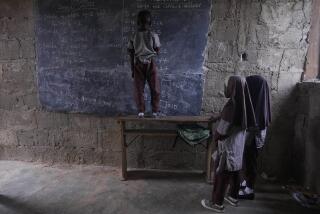Housing Crunch in New Nigeria Capital
- Share via
ABUJA, Nigeria — Armed police stand over shabby furnishings removed from a house in Nigeria’s new capital Abuja as their commander pins a notice to the locked door denoting its new owner.
Bemused neighbors in the ramshackle Karu area look on, knowing that they could be the next victims of the Task Force on Recovery of Government Houses in this incomplete city hewn from scrubland and rocky outcrops.
Hours earlier, soldiers and civilians had grabbed hold of wriggling white pigeons just released by President Ibrahim Babangida during a ceremony to remember Nigeria’s war dead.
“This is dinner. It would cost me 30 naira ($3) in a market,” said a smiling boy as Babangida drove away under heavy guard to his spacious new residence.
Housing shortages and soaring prices charged by get-rich-quick merchants are casting shadows over Abuja, since December the official seat of government in Africa’s most populous state.
Abuja, dubbed “Unity City,” has been called a dream come true by officials, who hail its location between the mainly Muslim north and largely Christian south in a country tormented by sectarian rivalries.
Officials say the city is unlikely to be finished until early in the next century. Herds of cattle and goats still roam large tracts of snake-infested land planned for building.
The military government in January terminated foreign and domestic contracts totaling $180 million because of the slow pace of work in the city, which so far has consumed an estimated $5 billion.
Most residents welcome living away from the former coastal capital of Lagos, one of the world’s most unmanageable and overcrowded cities 500 miles to the southeast, but bemoan the conditions they are forced to endure.
“No honest resident will say the movement has brought goodies. Rather, untold hardship,” said Tola Ojo, one of at least 50,000 civil servants now in Abuja, earmarked to have a total population of 3.1 million people by the year 2000.
“The prices of almost everything are on the increase, ranging from foodstuffs to transportation, as well as the problem of accommodation, which is the most acute,” he said.
Another civil servant, Tunde Aigbogun, said: “The attitude of people operating business ventures is irresponsible. They see the new city as a gold mine.”
In contrast with spacious homes and offices built for senior officials, many people sleep sometimes three to a room in Spartan apartment blocks, in offices or in teeming dormitory towns.
“The government must do something on accommodation but many farmers refuse to give up land,” said Osman Dagara, who runs a drugstore in the crowded mud-brick satellite town of Karu.
The government plans to develop up to 12 satellite towns. It blames private developers for being slow to invest in Abuja, where shops and entertainment areas are in short supply.
“House prices went up as soon as Babangida arrived in mid-December,” said Okey Nwachukwu, who works in a real estate agency.
“There are very few houses on the market and demand is far outstripping supply. There is a need for at least 90,000 places for low-income people,” he said.
A privately built, four-bedroom house costs about $40,000 a year, more than in most parts of Lagos, while three-bedroom apartments cost $15,000.
Such prices are prohibitive for most people in a country hit by rising inflation and where the minimum daily wage of 90 cents is not enough to buy a loaf of bread.
More to Read
Sign up for Essential California
The most important California stories and recommendations in your inbox every morning.
You may occasionally receive promotional content from the Los Angeles Times.













